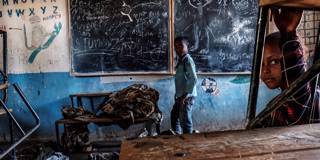The human toll of war reaches far beyond the number of those who die on the battlefield. As the war in Ethiopia’s Tigray region expands, an entire generation of children is facing a disruption to their education that will limit their economic opportunities and could fuel further conflict.
LONDON – The civil war in northern Ethiopia has entered its 11th month. The conflict, which started in the Tigray region, has expanded to the neighboring regions of Amhara and Afar. More than two million people have been displaced and the destruction of civilian infrastructure has been significant. Humanitarian agencies warn that hundreds of thousands of people are on the verge of starvation. Allegations of mass atrocities abound.
As with most civil wars, women and children are bearing the brunt of the effects. The burden is particularly heavy on schoolchildren in the conflict zone and surrounding areas, who already have suffered significant learning losses due to restrictions caused by the COVID-19 pandemic. Authorities claim that more than 7,000 schools have been destroyed or damaged by the fighting, which could keep more than 1.4 million students out of classrooms in the upcoming academic year. The United Nations reports that aid agencies have been able to reach only 4% of girls and boys in need of emergency assistance in education. And because the state often relies on teachers throughout the country to carry out other kinds of civic duties, the mobilization for war might affect education in other regions.
The war effort also could divert budgetary resources from sectors like education as defense spending grows. In the budget for the 2021-22 fiscal year, the share of defense spending has increased by 0.5 percentage points, which is equivalent to a one-third increase in the nominal value of military expenditure, while the share of education spending has declined by 0.2 percentage points. Even if the government attempts to protect education spending, teachers – who already struggle with their relatively low public-sector salaries – could be hit hard by soaring inflation, which has reached 30% as a result of deficit financing and supply-side problems. This inevitably will demoralize and demotivate the country’s teachers.

LONDON – The civil war in northern Ethiopia has entered its 11th month. The conflict, which started in the Tigray region, has expanded to the neighboring regions of Amhara and Afar. More than two million people have been displaced and the destruction of civilian infrastructure has been significant. Humanitarian agencies warn that hundreds of thousands of people are on the verge of starvation. Allegations of mass atrocities abound.
As with most civil wars, women and children are bearing the brunt of the effects. The burden is particularly heavy on schoolchildren in the conflict zone and surrounding areas, who already have suffered significant learning losses due to restrictions caused by the COVID-19 pandemic. Authorities claim that more than 7,000 schools have been destroyed or damaged by the fighting, which could keep more than 1.4 million students out of classrooms in the upcoming academic year. The United Nations reports that aid agencies have been able to reach only 4% of girls and boys in need of emergency assistance in education. And because the state often relies on teachers throughout the country to carry out other kinds of civic duties, the mobilization for war might affect education in other regions.
The war effort also could divert budgetary resources from sectors like education as defense spending grows. In the budget for the 2021-22 fiscal year, the share of defense spending has increased by 0.5 percentage points, which is equivalent to a one-third increase in the nominal value of military expenditure, while the share of education spending has declined by 0.2 percentage points. Even if the government attempts to protect education spending, teachers – who already struggle with their relatively low public-sector salaries – could be hit hard by soaring inflation, which has reached 30% as a result of deficit financing and supply-side problems. This inevitably will demoralize and demotivate the country’s teachers.